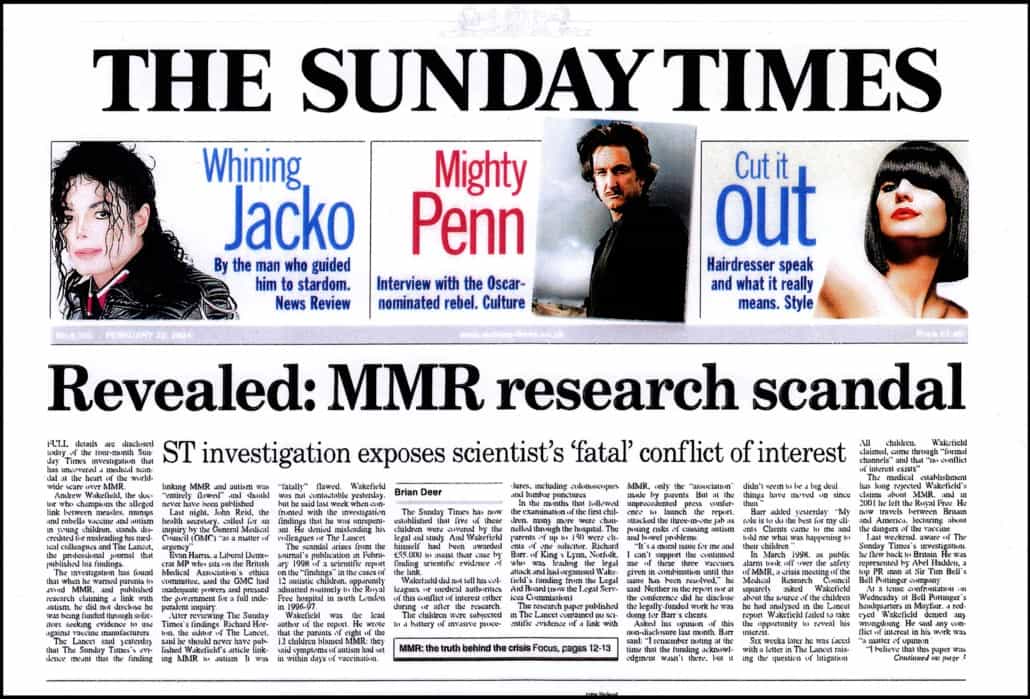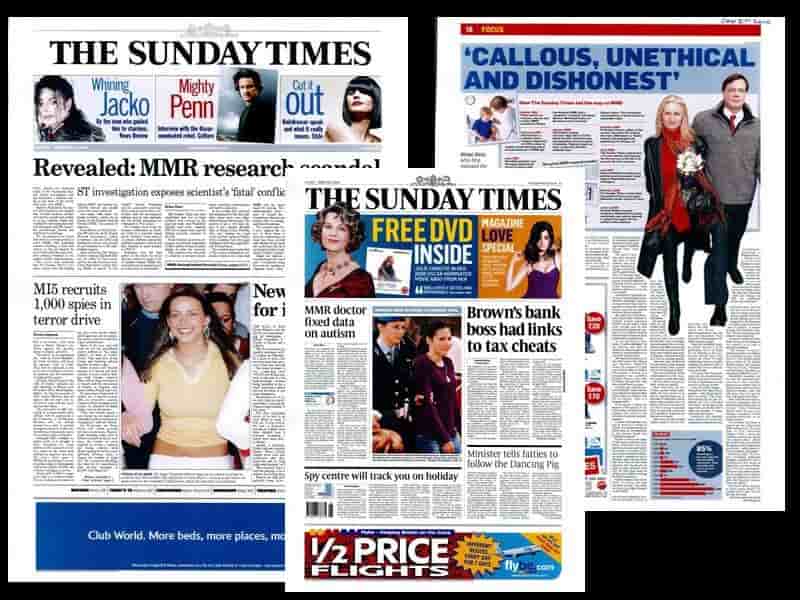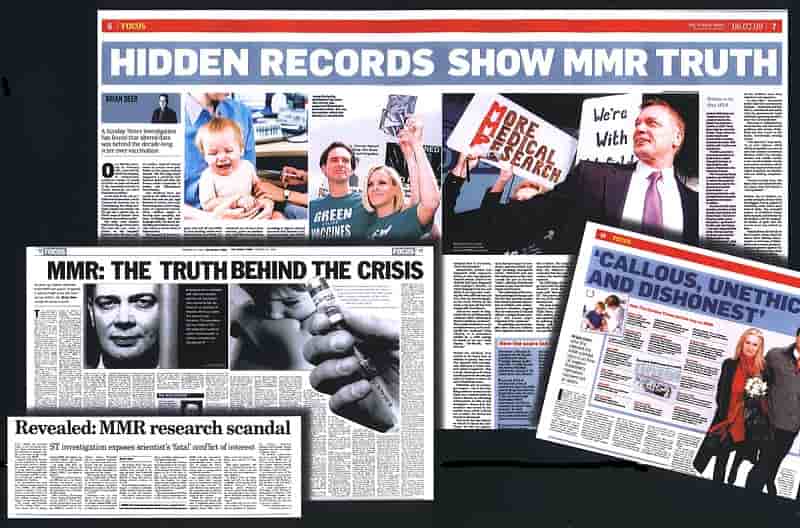Reprint
![]()
Revealed: MMR research scandal
The Sunday Times, February 22 2004
Brian Deer
FULL details are disclosed today of the four-month Sunday Times investigation that has uncovered a medical scandal at the heart of the worldwide scare over MMR.
Andrew Wakefield, the doctor who champions the alleged link between measles, mumps and rubella vaccine and autism in young children, stands discredited for misleading his medical colleagues and The Lancet, the professional journal that published his findings.
Follow Brian on Twitter:
The investigation has found that when he warned parents to avoid MMR, and published research claiming a link with autism, he did not disclose he was being funded through solicitors seeking evidence to use against vaccine manufacturers.
The Lancet said yesterday that The Sunday Times’s evidence meant that the finding linking MMR and autism was “entirely flawed” and should never have been published. Last night, John Reid, the health secretary, called for an inquiry by the General Medical Council (GMC) “as a matter of urgency”.
READ HOW DEER’S WAKEFIELD
INVESTIGATION WAS CHECKED
Evan Harris, a Liberal Democrat MP who sits on the British Medical Association’s ethics committee, said the GMC had inadequate powers and pressed the government for a full independent inquiry. After reviewing The Sunday Times’s findings, Richard Horton, the editor of The Lancet, said he should never have published Wakefield’s article linking MMR to autism. It was “fatally” flawed.
Wakefield was not contactable yesterday, but he said last week when confronted with the investigation findings that he was unrepentant. He denied misleading his colleagues or The Lancet. The scandal arises from the journal’s publication in February 1998 of a scientific report on the “findings” in the cases of 12 autistic children, apparently admitted routinely to the Royal Free hospital in north London in 1996-97.
Wakefield was the lead author of the report. He wrote that the parents of eight of the 12 children blamed MMR: they said symptoms of autism had set in within days of vaccination. The Sunday Times has now established that four, probably five, of these children were covered by the legal aid study. And Wakefield himself had been awarded up to £55,000 to assist their case by finding scientific evidence of the link.
Wakefield did not tell his colleagues or medical authorities of this conflict of interest either during or after the research. The children were subjected to a battery of invasive procedures, including colonoscopies and lumbar punctures.
In the months that followed the examination of the first children, many more were channelled through the hospital. The parents of many were clients of one solicitor, Richard Barr, of King’s Lynn, Norfolk, who was leading the legal attack and had organised Wakefield’s funding from the Legal Aid Board (now the Legal Services Commission).
The research paper published in The Lancet contained no scientific evidence of a link with MMR, only the “association” made by parents. But at the unprecedented press conference to launch the report, attacked the three-in-one jab as posing risks of causing autism and bowel problems.
“It’s a moral issue for me and I can’t support the continued use of these three vaccines given in combination until this issue has been resolved,” he said. Neither in the report nor at the conference did he disclose the legally-funded work he was doing for Barr’s clients. Asked his opinion of this non-disclosure last month, Barr said: “I remember noting at the time that the funding acknowledgment wasn’t there, but it didn’t see to be a big deal . . . things have moved on since then.”
Barr added yesterday: “My role is to do the best for my clients. Clients came to me and told me what was happening to their children.”
In March 1998, as public alarm took off over the safety of MMR, a meeting of the Medical Research Council squarely asked Wakefield about the source of the children he had analysed in the Lancet report. Wakefield failed to take the opportunity to reveal his interest. Six weeks later he was faced with a letter in The Lancet raising the question of litigation. All children, Wakefield claimed, came through “formal channels” and that “no conflict of interest exists”.
The medical establishment has long rejected Wakefield’s claims about MMR, and in 2001 he left the Royal Free. He now travels between Britain and America, lecturing about the dangers of the vaccine.
Last weekend, aware of The Sunday Times’s investigation, he flew back to Britain. He was represented by Abel Hadden, a top PR man at Sir Tim Bell’s Bell Pottinger company. At a tense confrontation on Wednesday at Bell Pottinger’s headquarters in Mayfair, a red-eyed Wakefield denied any wrongdoing. He said any conflict of interest in his work was “a matter of opinion”.”I believe that this paper was conducted in good faith,” he said. “It reported the findings. There was no conflict of interest. Do we have any reasons [now] to change our opinion? No, but then again it’s a debate.”
Get Deer’s book: The Doctor Who Fooled the World
As he was speaking, the findings of the investigation were also being shown to Horton at The Lancet. Shocked, Horton later called in Wakefield and visited the Royal Free on Thursday to talk to Wakefield’s former colleagues and inspect records. By Friday, Horton and his fellow editors were faced with a dilemma: should they respect The Sunday Times’s confidence and wait for the storm to break today? Or rush out a press release criticising Wakefield and taking credit for disclosing his fatal conflict of interest? They chose the latter.
Simon Murch, one of the leading doctors involved with Wakefield’s research at the Royal Free, said yesterday that news of the £55,000 legal funding was “a very unpleasant surprise”.”We didn’t know. We were pretty taken aback. The timing of it before the paper is something we have all been shocked by. If you have a colleague who has not told you, if you have not been informed you are going to be taken aback.”
He went on: “I am not going to join the queue of people rushing up to kick Andy. But it is right that this has come out: there has been a complete conflict of interest.”
Murch said it was never made clear that the payment was in place before the report was published. “We never knew anything about the £55,000 — he had his own separate research fund,” said Murch. “All of us were surprised . . . We are pretty angry.”
He added: “This is not personal corruption. But there was a clear conflict of interest — it was not declared to us and it was not declared to the journal, and it should have been.” Murch said he believed that if Wakefield had made clear his interest, The Lancet would have asked for the report to be rewritten to focus on hard fact and to “leave the speculation, leave the measles story out of there”.
Another of Wakefield’s 12 co-workers in the study said: “I am very, very angry. I would never have put my name to the study if I had known there was this conflict of interest, and had I not done so it would never have got published.”
Follow Brian on Twitter:
Another author, Dr Peter Harvey, a board member of Visceral, a registered charity set up to support Wakefield, spoke out in his defence. Harvey said he did not think the funding was relevant and he would have still have put his name to the study if he had known. “I don’t think there was any conflict of interest,” he said.
Dr Richard Smith, editor of the British Medical Journal, said, however: “That MMR paper is the best example there has ever been of a very, very dodgy paper that has created a lot of discomfort and misery.”
CONTINUES: “MMR: The truth behind the crisis”




READ HOW DEER’S WAKEFIELD
INVESTIGATION WAS CHECKED
Invite Brian Deer to speak at your event
Hear the astonishing true story of the plot behind today’s controversy over vaccines, and its exposure by an investigative journalist
Contact Brian
Follow Brian on Twitter:
RELATED:
Vexatious Wakefield lawsuits fail
